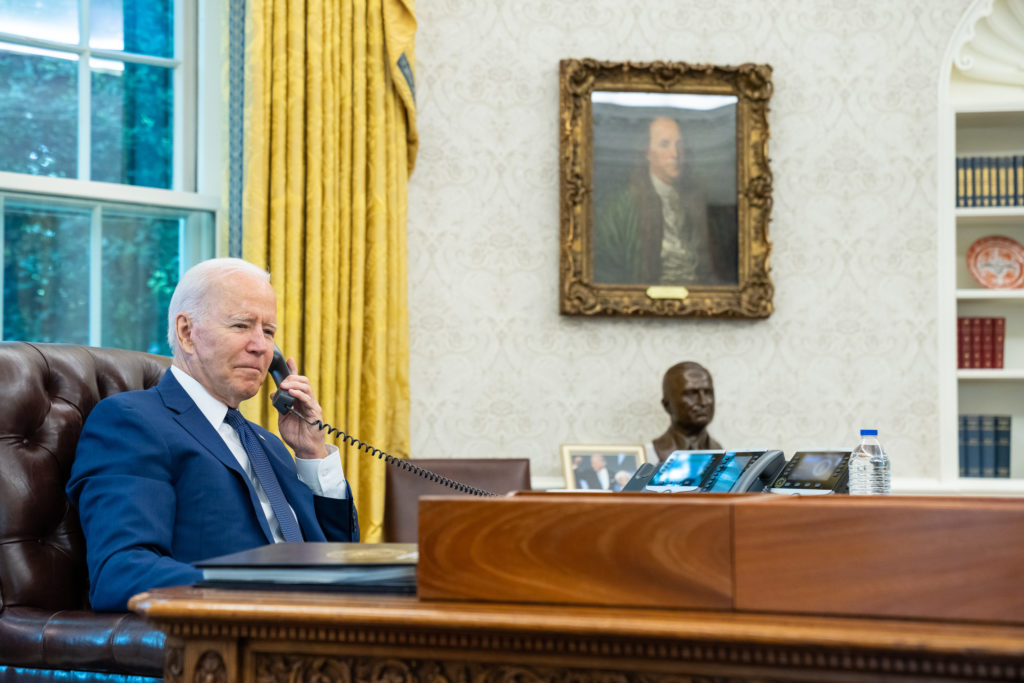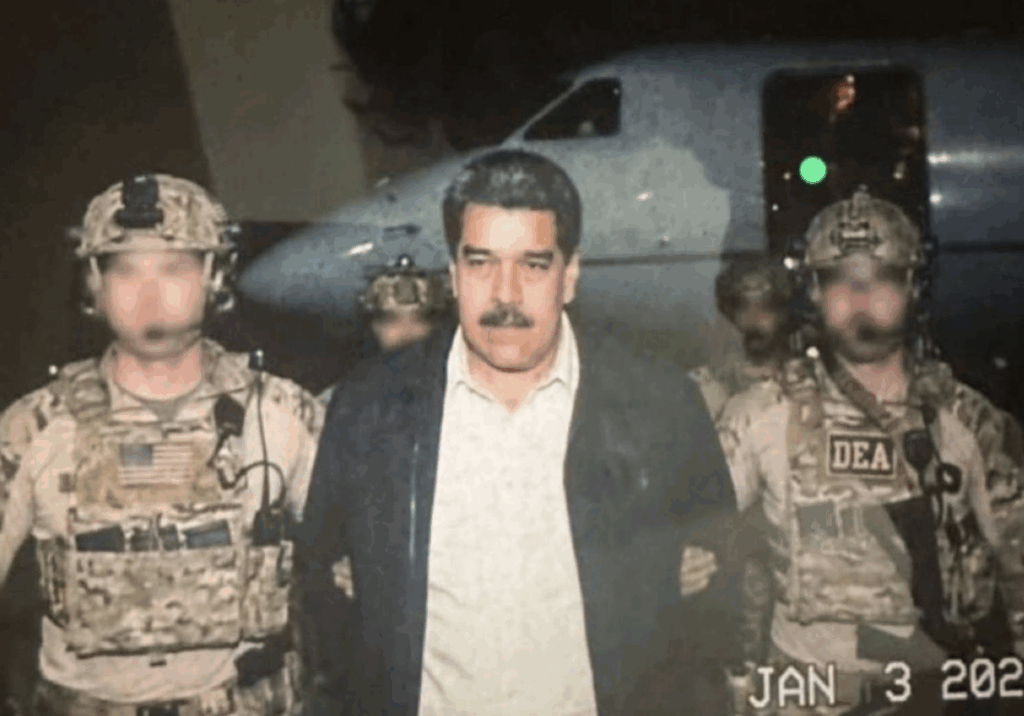Australia/Israel Review
Decision time on Iran
Oct 25, 2021 | Jacob Nagel, Richard Goldberg

The Biden Administration now has only one good option
Over the next few weeks, US President Joe Biden will face the biggest decision of his presidency regarding Iran. He can finally take “no” for an answer and build a coalition to hold Teheran accountable for its nuclear deceit and misconduct. Or, he can fall into the mullahs’ trap and close the door on achieving his goal of a longer and stronger nuclear agreement in the future.
For months now, the Biden Administration has been operating under a mistaken assumption. The Administration believed that if the United States eased the political and economic pressure on Iran while abjuring any credible threat of military force, Teheran would potentially negotiate a replacement to the flawed 2015 nuclear deal, formally known as the Joint Comprehensive Plan of Action (JCPOA), from which then President Trump withdrew in 2018. In fact, the opposite has proven true.
Iran entered this year with just US$4 billion in accessible foreign exchange reserves, a US president who demonstrated a willingness to use force against it, and the possibility that the International Atomic Energy Agency’s (IAEA) Board of Governors might refer the regime to the UN Security Council for breach of the Nuclear Non-Proliferation Treaty (NPT). Tellingly, Iran began producing highly enriched uranium in early January only because the regime was confident the Trump Administration – days from leaving office – no longer had the political ability to respond militarily. Had the economic and political pressure of 2020 intensified in 2021, the United States would likely already be in negotiations with Iran over a new nuclear agreement.
But on Jan. 20, 2021, the mullahs got a new lease on life as the Trump campaign of maximum pressure shifted to a Biden campaign of maximum deference. Rather than continue to starve the regime of cash, Biden allowed Iran to use its frozen reserves to repay foreign debts while pulling back European allies from censuring Iran over its continued refusal to cooperate with an IAEA investigation into undeclared nuclear sites and materials. At the same time, Iran tested Biden through its regional proxies with sustained attacks on American troops in Iraq, rocket and missile attacks on Israel and Saudi Arabia, and attacks on maritime shipping. Yet Biden did not retaliate as his predecessor did by targeting the personnel of the Islamic Revolutionary Guard Corps, which directed these attacks – even after the death of a US contractor.
The results? The most aggressive expansion of Iran’s uranium enrichment program to date, the most audacious limitation of UN inspections in Iran’s history, and the instalment of an Iranian hardline government determined to hold on to a new nuclear baseline for future negotiations. Biden allowed Iran to flip the script in a matter of months – from an increasingly contained regime on the verge of financial collapse to an increasingly confident regime inches away from a nuclear breakout capability. The regime could even pursue something even more dangerous: a nuclear “sneakout” wherein Iran uses clandestine facilities and advanced centrifuges to prepare a detonation.
Iran is operating advanced centrifuges, enriching uranium to 60% purity – just a short distance from weapons-grade fissile material – and working on uranium metal technologies. It is advancing both the enrichment and weaponisation tracks needed to build a bomb.
Iran refuses to answer the IAEA’s questions as to why the agency has found nuclear material in at least three locations previously unknown to be linked to its nuclear program and why Iran never declared those sites to the agency. It has refused to give the IAEA the video recordings of its declared sites, limiting the analysis of the agency and its inspectors. The regime is not just in significant non-performance of its commitments under the JCPOA – it is in material breach of its more fundamental obligations under the NPT.
Since Biden became President, the IAEA board has met three times. Before each meeting, the Administration has opposed diplomatic attempts to censure Iran for its non-cooperation with the IAEA and its non-compliance with the NPT, despite harsh reports from the agency’s Director General. After each meeting, Iran has accelerated its nuclear misconduct and further obstructed access for the IAEA and cooperation with its investigation. Just days after the IAEA’s September board meeting, Iran denied the agency access to yet another site – a centrifuge assembly facility in Karaj – even though the regime agreed to such access just days before the board meeting.
If the international community needed one more reminder that pressure, not appeasement, is the only proven formula to win Iranian cooperation, the story of Karaj was it. As the world looks to the final IAEA board meeting of the year in November, the credibility of the NPT and the IAEA, along with Director General Rafael Grossi, is now in serious doubt.
If Biden makes the same mistake for a fourth time, he alone will bear responsibility for what comes next – a green light for further nuclear escalation into 2022. Now is the time for the President to turn the tables. In coordination with US allies in Europe, the Biden Administration should request an immediate special meeting of the IAEA board – before its November meeting – to hold Iran accountable for its wide range of illicit conduct. This should be followed quickly with a formal resolution, at the November quarterly board meeting, that censures Iran not just for its enrichment ramp-up and limited access to inspectors, but also for its non-compliance with a now three-year-old safeguards investigation.
There will undoubtedly be voices within the Biden Administration, including Special Envoy for Iran Robert Malley, and maybe even Secretary of State Antony Blinken, who will look for any excuse to keep the current policy in place.
Malley, perhaps coordinating with Russia, China, and some European Union diplomats also desperate to preserve the old JCPOA framework at any cost, could schedule the next round of indirect US-Iran negotiations just before the November quarterly meeting of the IAEA Board of Governors. If the Iranian delegates so much as smile at their interlocutors – let alone introduce a proposal that falls short of Biden’s demands – Malley will still argue to hold off any further political pressure.
Another potential pitfall: Iran could grant access to Karaj just before the November board meeting – giving Malley and others an opening to argue that Washington has achieved progress even though Karaj access is merely the latest ploy that Teheran has advanced to distract from its underlying nuclear misconduct.
Biden and his senior advisers need to recognise that after more than eight months of squandering US economic leverage and allowing Iran to vastly increase its nuclear leverage, Malley’s advice leads back neither to the JCPOA nor to a longer and stronger deal. Instead, it leads to something even worse: the so-called concept of “less for less”, where the US provides “partial” sanctions relief for “partial” Iranian nuclear concessions.
“Partial sanctions relief” for “partial nuclear steps” may sound appealing on its face but the US is dealing with a regime whose expertise is hobbling along with limited financial resources; partial sanctions relief is the very outcome the mullahs now seek. It will allow them to continue their terror support activities all over the world and bag their nuclear advances as a new baseline for future negotiations. As we saw in 2013, an interim agreement that grants partial sanctions relief and removes all US leverage ends up becoming a flawed final deal.
The status quo is untenable. But a return to a deeply flawed and expiring JCPOA or an even worse “less for less” deal is equally unacceptable. President Biden has only one good option: reconstitute a coalition of democracies willing to exert economic and political pressure alongside sustained military deterrence to force Iran to comply with its NPT obligations and negotiate the longer, stronger deal he has always wanted.
China and Russia will complain along the way. Let them. They are powerless to stop a diplomatic coalition of the United States, its transatlantic and transpacific allies, and key allies in the Middle East. Neither Beijing nor Moscow can stop an IAEA board referral to the Security Council – nor can they stop a snapback of UN sanctions.
The Biden Administration is fond of saying that US leadership at multilateral institutions like the IAEA “is back”. The world will be watching Vienna in the weeks ahead to see if that’s really true.
Richard Goldberg is a senior adviser at the Foundation for the Defense of Democracies (FDD). He previously served on the US National Security Council. Brig. (res.) Prof. Jacob Nagel is a senior fellow at FDD and a visiting professor at the Technion Aerospace faculty. He previously served as head of Israel’s National Security Council. This article first appeared in The Dispatch (thedispatch.com). © FDD (www.fdd.org), reprinted by permission, all rights reserved.
Tags: Iran, JCPOA, United States






